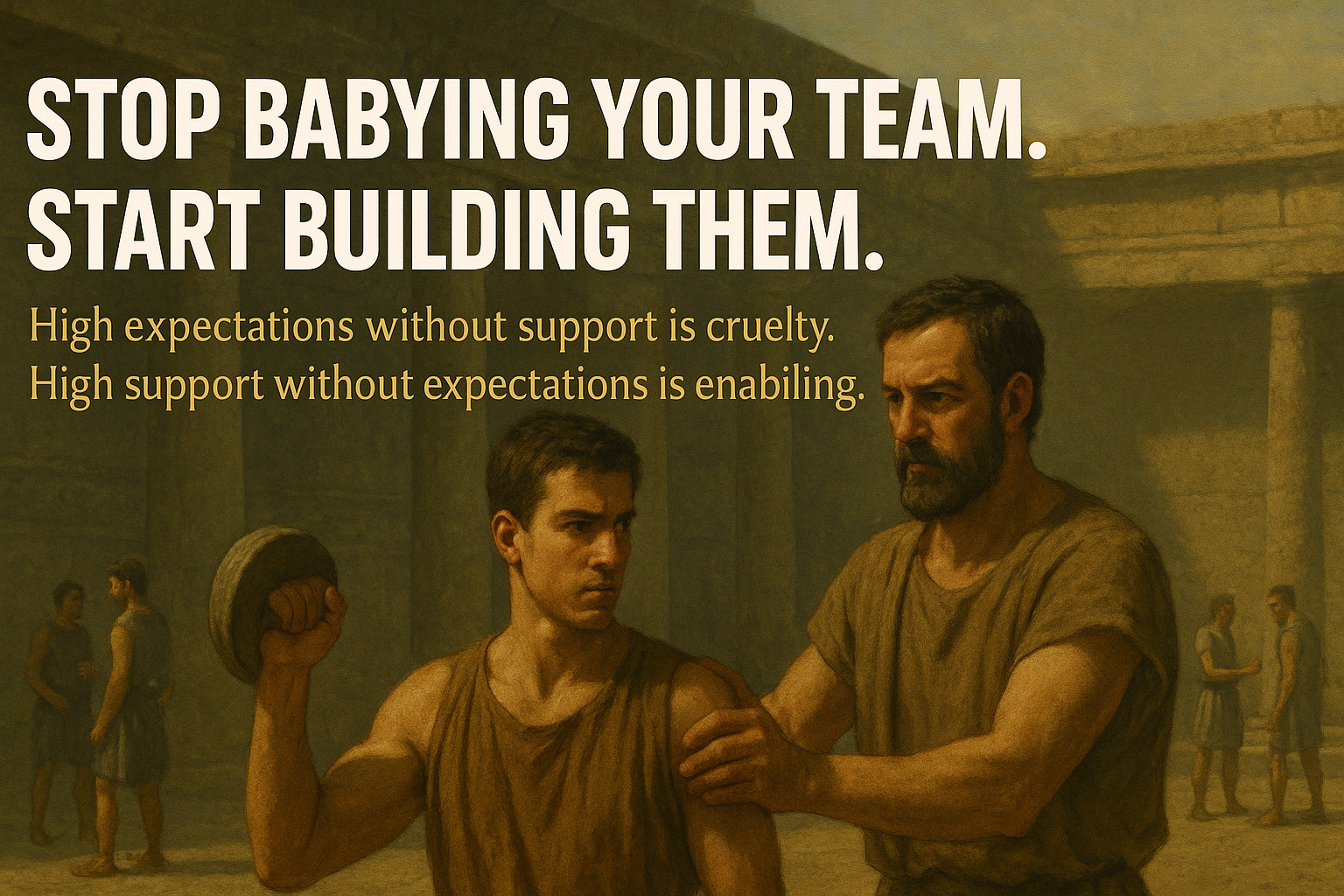
Stop Babying Your Team. Start Building Them.
By Derek Neighbors on November 14, 2025
Here’s what destroys teams: leaders who think they must choose between demanding excellence and caring about people.
This false choice creates two types of failure. Tough leaders who break people. Nice leaders who keep them small. Both serve the leader’s comfort over the team’s growth.
You don’t get to pick one. Real leadership requires both at the same time.
I watched a manager destroy his best people with kindness. He prided himself on being “the nice boss.” Never pushed people beyond their comfort zone. Always accepted “good enough” work. Made sure everyone felt supported and understood.
His best people left within eighteen months.
Not because he was mean. Because he kept them small. A “good vibes only” environment keeps people weak. They went to teams that would challenge them, push them, make them better. Teams where the standards were higher and the work was harder.
The painful realization hit him: his niceness wasn’t helping people. It was imprisoning them.
The Ancient Wisdom We Forgot
The ancient Greeks had a concept called paideia. It meant education, but not the way we think about it today. Not information transfer or skill training. Character formation. The whole process of developing a person to their full potential.
And here’s what the Greeks understood that we’ve forgotten: you can’t build character without difficulty. But you also can’t build it without relationship.
The teacher who cares pushes the student to grow. The teacher who doesn’t care either ignores them or breaks them.
Think about the ancient athletic trainers. They pushed their students hard. Demanded excellence. Wouldn’t accept half-effort or excuses. But they also tended their injuries. Taught proper technique. Built them up when they got discouraged. They held both: high expectations AND high support.
The same with philosophers who challenged their students’ thinking while supporting their development. Military trainers who demanded excellence while building brotherhood. Teachers who held rigorous standards while caring about their students’ growth.
This wasn’t contradictory to them. It was inseparable. You couldn’t truly care about someone without challenging them. You couldn’t truly challenge them without caring. The relationship was what made the difficulty productive rather than destructive.
The key insight: high expectations without support equals cruelty. High support without expectations equals enabling. Both together equals character formation.
This is paideia. Not picking one or the other. Holding both at the same time. Believing someone is capable of more while helping them get there. Refusing to accept less than their potential while refusing to abandon them in the struggle.
Why does this matter? Because eudaimonia, human flourishing, requires actualizing your capacity. A leader who doesn’t challenge you prevents your flourishing. A leader who doesn’t support you abandons your development. Both fail the same fundamental obligation: helping people become what they’re capable of becoming.
Character isn’t personality traits. It’s the developed capacity to choose virtue consistently. That capacity gets built through productive struggle. Difficulty that teaches. Supported by care that sustains.
We’ve lost this wisdom. We’ve separated “tough” from “caring.” Made challenge the enemy of compassion. Forgot that real care requires pushing people to grow.
How We Got This Wrong
Modern workplace culture split these apart. Now we have two types of leaders, and both fail.
The “Tough” Leader sets high expectations but provides no support. They demand results but offer no help getting there. Set standards but give no development path. Push people but don’t care if they break.
This creates fear, not excellence. People either burn out or leave. You get short-term results at the cost of long-term capability. The team gets destroyed in the process.
The “Nice” Leader gives high support but sets no expectations. They care about people but accept mediocre work. Provide help but never push for growth. Protect feelings at the cost of development.
This creates comfort, not capability. People stay small. Eventually they resent you for it. They realize you’ve been keeping them weak while calling it kindness. Tolerating mediocrity doesn’t protect your team, it destroys them.
Here’s the uncomfortable truth: babying your team feels like caring. But it’s actually selfish. You’re prioritizing your comfort over their growth. Avoiding tough conversations because they’re hard for you. Accepting poor work because holding standards feels mean.
I saw a VP who wouldn’t give critical feedback because it might “demotivate” people. A manager who did employees’ work for them rather than teach them to struggle through it. A leader who accepted work below standard to “be understanding.”
All felt like they were being compassionate. All were keeping their people weak. This is servant leadership failing because it serves from weakness, not from strength.
The worst part: their teams knew it. You can feel when someone has stopped believing in your potential. When they accept your mediocre work, they’re telling you they don’t think you’re capable of better. That’s not kindness. That’s giving up on someone while smiling.
What Integration Actually Looks Like
Neither approach works alone. Both are necessary. Neither is sufficient.
High expectations without support looks like: “Hit these numbers” with no training. “Fix this problem” with no resources. “Be excellent” with no path to get there. That’s not leadership. That’s abandonment.
High support without expectations looks like: unlimited understanding for missed deadlines. Accepting work below someone’s capability. Making excuses for them instead of challenging them. That’s not compassion. That’s imprisonment.
The integrated approach requires both working together.
High expectations means: Believing they’re capable of more than they think they are. Holding the line on standards even when it’s uncomfortable. Refusing to accept work that’s below their capability. Seeing their potential, not just their current performance.
High support means: Providing the tools, training, and resources they need. Being present when they struggle. Caring about their development, not just their output. Helping them build the skills to meet the expectations.
Together they create challenge that builds rather than breaks. Care that develops rather than enables. Growth that’s hard but not lonely. Excellence that’s demanding but achievable.
This doesn’t mean never accepting temporary recovery. Someone genuinely at capacity needs support without additional challenge until they recover. But that’s temporary accommodation, not permanent lowering of standards. The difference: temporary is time-bound with a return plan. Permanent is accepting new limits as their ceiling.
The shift: don’t lower the bar to protect feelings. Raise the bar AND provide the support to reach it. Care enough to push them. Push them because you care.
How To Actually Do This
First, set clear, high standards. Be specific about what excellence looks like. Don’t apologize for having standards. Make expectations clear upfront. Believe they can reach them.
Not vague aspirations. Concrete standards. “This level of work is acceptable. This level isn’t.” Clear boundaries that don’t shift based on how someone feels about them.
Second, provide real support. Give them the training they need. Remove obstacles in their way. Be available when they struggle. Teach them, don’t just tell them.
Support isn’t lowering standards. It’s helping them meet the standards you’ve set. It’s saying “here’s what excellent looks like, and here’s how to get there.”
Third, hold both simultaneously. When they miss the standard, don’t lower it. When they struggle, don’t abandon them. Give feedback that’s both honest AND helpful. “This isn’t good enough, here’s how to make it better.”
The conversation shifts from “this is fine” to “you’re capable of better, let me help you get there.”
Fourth, make struggle productive. Challenge should build, not just test. Support should develop, not just comfort. They should leave hard things more capable, not just exhausted or coddled.
The difference: productive struggle teaches them something they can use next time. Unproductive struggle just burns energy without building capacity. Your job is ensuring the difficulty serves their development, not just your schedule or ego.
Ask yourself: Am I protecting them or imprisoning them? Am I pushing them or breaking them? Would they thank me in five years for this? Am I serving their growth or my comfort?
These questions cut through the comfortable stories you tell yourself about why you’re accepting mediocrity or demanding without supporting.
What changes: your best people stay and get better. Your average people rise to the challenge. Your weak people either grow or leave. Your team becomes capable, not just comfortable.
This requires character from you. Courage to have hard conversations. Compassion to stay engaged when they struggle. Wisdom to know when to push and when to support. Commitment to their growth over your comfort. Character is the foundation, and without it, no leadership technique saves you.
The Choice You’re Making
It’s easier to baby your team. It’s easier to demand without supporting. It’s hardest to do both at once.
But only the hard path builds character.
Babying your team keeps them dependent on you. Building them makes them capable without you. One serves your ego. One serves their excellence.
The ancient Greeks understood paideia wasn’t about being nice or being tough. It was about caring enough to challenge. And challenging because you care. That’s how character gets forged.
The question isn’t whether you should have high expectations or provide high support. The question is whether you have the character to hold both at the same time.
Are you keeping your team small to keep them comfortable? Or building them strong even when it’s hard?
The answer is visible in their capability. Not their opinion of you.
Final Thoughts
Look at your team right now. Not their potential. Not their future. Their current capability.
If they’re not growing, you’re either not challenging them enough or not supporting them enough. One keeps them comfortable. One breaks them. Neither serves their excellence.
This isn’t about building better employees for your organization. It’s about serving their flourishing. You have people under your leadership for a limited time. Your obligation is leaving them more capable, more fully human, than when you got them. That’s not management. That’s paideia.
Real leadership isn’t about choosing between being the demanding boss or the caring boss. It’s about being both at the same time. Expecting more because you believe in them. Supporting them because you’re invested in their growth. Their growth, not your convenience.
The hard truth: most leaders fail at this because holding both requires more character than picking one. It’s easier to be nice and accept mediocrity. It’s easier to be tough and ignore struggle. It’s hardest to care enough to push and push because you care. If you want better leaders, stop naming them and start developing them through this kind of integrated challenge.
Your team will know which leader you are. Not by what you say about development. By whether they’re more capable six months from now than they are today.
That’s the only measure that matters.
Ready to develop the character and capability to build excellence in others? MasteryLab provides frameworks and community for leaders who are done protecting feelings and ready to develop people. Because real care requires real challenge.



